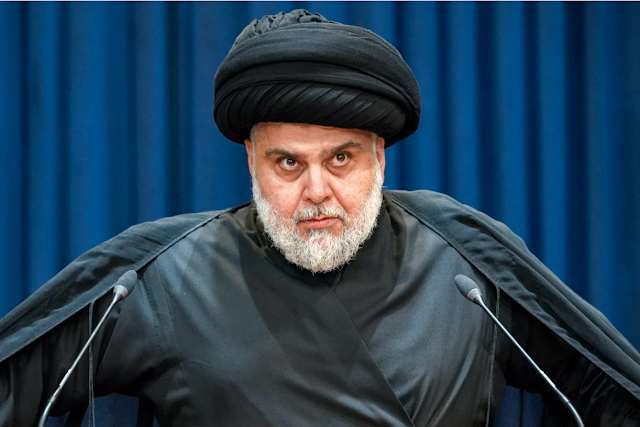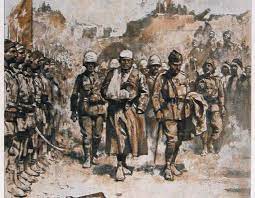 |
| (EPA) |
1920 High Commissioner Sir Cox reported that many sheikhs of large confederations supported
Mandate and didn't want an Iraqi govt
(Musings On Iraq review Inventing Iraq: The Failure of Nation Building and a History Denied)
 |
| (EPA) |
1920 High Commissioner Sir Cox reported that many sheikhs of large confederations supported
Mandate and didn't want an Iraqi govt
(Musings On Iraq review Inventing Iraq: The Failure of Nation Building and a History Denied)
 |
| (The Guardian) |
1934 Yasin al-Hashemi Rashid Ali Al-Gaylani of Ikha criticized PM Ayubi Jawadat for elections he
held because excluded them Senate criticized vote PM started being called a tyrant
(Musings On Iraq review Independent Iraq 1932-1958, A Study in Iraqi Politics)
Ritter, Scott, Iraq Confidential, The Untold Story of the Intelligence Conspiracy to Undermine the UN and Overthrow Saddam Hussein, New York: Nation Books, 2005
Iraq Confidential, The Untold Story of the Intelligence Conspiracy to Undermine the UN and Overthrow Saddam Hussein was former U.N. inspector Scott Ritter’s second book on his experiences working in Iraq. He claimed the United States undermined the inspection process from the start not supporting it, trying to manipulate it, and ultimately giving up on it. The problem is much of his story contradicts what he wrote in his first book Endgame, Solving The Iraq Crisis. That begs the question of which version is the reader supposed to believe?
 |
| (Iraqi Parliament Media Office) |
 |
| (U.S. Air Force Photo) |
1920 Iraq High Commissioner Sir Percy Cox wrote Iraqis wanted an outsider as ruler UK didn’t need
an election to pick one Could fix it so Faisal would become King
(Musings On Iraq review Empires of the Sand, The Struggle For Mastery In The Middle East 1789-1923)
 |
| (AFP/Getty Images) |
1920 Gertrude Bell wrote that Faisal was the only solution to Iraq and its first choice to be king
(Musings On Iraq review Gertrude Bell And Iraq)
(Musings On Iraq review Gertrude Bell, Explorer of the Middle East)
(Musings On Iraq movie review Letters from Baghdad)
(Musings On Iraq review Desert Queen, The Extraordinary Life of Gertrude Bell: Adventurer, Adviser to Kings, Ally of Lawrence of Arabia)
(Musings On Iraq review Empires of the Sand, The Struggle For Mastery In The Middle East 1789-1923)
 |
| (Radio Farda English) |
1920 Iraq-Syria border set with Deir Azzor going to latter
(Musings On Iraq interview with Princeton’s Sara Pursley on Sykes-Picot and creation of Iraq)
Melton, Stephen, The Clausewitz Delusion, How the American Army Screwed Up the Wars in Iraq and Afghanistan (A Way Forward), Minneapolis: Zenith Press, 2009
In The Clausewitz Delusion, How the American Army Screwed Up the Wars in Iraq and Afghanistan (A Way Forward) the U.S. Army Staff College’s Stephen Melton argues that the U.S. military’s doctrine led it to fail in its most recent conflicts. The author believed that America threw away decades worth of history fighting offensive wars and subsequent occupations that started in colonial times for a defensive approach during the Cold War and planned for short imperial battles after embracing Carl von Clausewitz after Vietnam. That left the U.S. unprepared for wars like Afghanistan and Iraq.
 |
| (EPA) |
1956 Communist uprising in Al-Hay put down and leaders executed
(Musings On Iraq review The Modern History of Iraq)
(Musings On Iraq review Red Star Over Iraq, Iraqi Communism Before Saddam)
(Musings On Iraq A History Of The Iraqi Communist Party Interview With Univ of East Anglia’s Johan Franzen)
 |
| (Bas News) |
 |
| (Council on Foreign Relations) |
869 Abbasid Caliph Muhtadi had to flee capital Samarra as Turkish troops looted palace Muhtadi
confronted troops calling for their loyalty and received it
(Musings On Iraq review when baghdad ruled the muslim world, the rise and fall of islam’s greatest dynasty)
1922 UK Lord of the Admiralty told Iraq commission Iraq oil would be important in case of war in
Far East
Rosen, Nir, Aftermath, Following the Bloodshed of America’s Wars in the Muslim World, New York: Nation Books, 2010
Journalist Nir Rosen said others in his field spent too much time talking to American officials, the U.S. military and the Iraqi government and ignored what was happening to regular people during the Iraq War. His goal was to create something like a people’s history of the conflict focusing upon the street. He did that in large sections of Aftermath, Following the Bloodshed of America’s Wars in the Muslim World, but then there were major problem as well. While he was great at telling the stories of average Iraqis he completely misread the country’s politics. He also went to other countries like Jordan, Lebanon and Afghanistan which distracted from his main theme and often were completely unrelated. Finally, his anti-Americanism tainted his analysis as well.
 |
| (CNN) |
1932 League of Nations Mandate Comm rejected Assyrian petition for autonomy Said Iraqi
govt would settle Assyrians within country or outside of it
(Musings On Iraq review The Tragedy of the Assyrian Minority in Iraq)
(Musings On Iraq review State and Society in Iraq)
 |
| (AP) |
 |
| (Wikipedia) |
parliament
(Musings On Iraq review Supremacy And Oil, Iraq, Turkey, and the Anglo-American World Order, 1918-1930)
 |
| (AFP) |
1922 UK Colonial Office wrote only reason King Faisal accepted in Iraq was because he was
backed by British
 |
| (BBC) |
1936 Elections started for new parliament after 1936 coup Gen Sidqi wanted to control MPs and
exclude reformist Ahali who were part of govt Sidqi followers won 30 seats Ahali only 12
(Musings On Iraq review Independent Iraq 1932-1958, A Study in Iraqi Politics)
Heydemann, Steven, Editor, War, Institutions, and Social Change in the Middle East, Berkeley, Los Angeles, London: University of California Press, 2000
War, Institutions, and Social Change in the Middle East is an anthology of around a dozen articles about how war impacted the Middle East. Unlike most collections this one is remarkably consistent with one interesting piece after another. The editor Steven Heydemann wanted to put together articles that contradicted the Eurocentric view dominant in academia at the time that the changes Europe went through during wars in the 1600-1700s were applicable around the world.
 |
| (Dept of Defense) |
1985 Saudis announced attempt to end the Iran-Iraq War through dialogue with Tehran
(Musings On Iraq interview with author Anthony Tucker-Jones on Iran-Iraq War)
(Musings On Iraq interview with author Tom Cooper on Iran-Iraq War)
(Musings On Iraq review The Iran-Iraq War 1980-1988)
(Musings On Iraq review Iran-Iraq War, The Lion of Babylon, 1980-1988)
(Musings On Iraq review The Iran-Iraq War)
(Musings On Iraq review The Longest War, The Iran-Iraq Military Conflict)
(Musings On Iraq review The Iran-Iraq War Volume 1: The Battle for Khuzestan, September 1980-May 1982)
(Musings On Iraq review The Iran-Iraq War Volume 2: Iran Strikes back, June 1982-December 1986)
(Musings On Iraq review The Iran-Iraq War Volume 3: Iraq’s Triumph)
(Musings On Iraq review The Iran-Iraq War Volume 4: The Forgotten Fronts)
 |
| (AFP) |
 |
| (Biography) |
1914 UK made 2nd attack on Qurna, Basra forcing Ottomans to retreat Lost around 200 killed
130 taken prisoner UK lost 10 killed 118 wounded
(Musings On Iraq review When God Made Hell, The British Invasion of Mesopotamia and the Creation of Iraq, 1914-1921)
 |
| (Getty Images) |
1940 US Amb to Iraq sent note to PM Gaylani saying he was worried about direction of Iraq-
UK relations because of Gaylani’s overtures to the Axis
(Musings On Iraq review Persian Gulf Command, A History of the Second World War In Iran and Iraq)
(Musings On Iraq review Rashid Ali al-Gailani, The National Movement in Iraq 1939-1941)
(Musings On Iraq review Iraq And Syria 1941, The Politics and Strategy of the Second World War)
 |
| (Daily Sabah) |
1914 UK forced landed at Muzaira, Basra to seize Qurna Didn’t have troops to take town Retreated
(Musings On Iraq review When God Made Hell, The British Invasion of Mesopotamia and the Creation of Iraq, 1914-1921)
Culbertson, Shelly, The Fires of Spring, A Post-Arab Spring Journey Through the Turbulent New Middle East, Turkey, Iraq, Qatar, Jordan, Egypt, and Tunisia, New York: St. Martin’s Press, 2016
The Fires of Spring, A Post-Arab Spring Journey Through the Turbulent New Middle East is a travel journal by author Shelly Culbertson as she went through five countries to see how the Middle East had changed after the Arab Spring protests of 2011-12. She tried to give a brief history of each nation and then interviewed several people to try to find out what direction each country was going in. It’s a good introduction to the politics and societies of the region in the 2010s.
1915 Retreating British force attacked pursuing Ottomans at Um at Tubul after loss at Battle of
Ctesiphon/Salman Pak
 |
| (BBC) |
1914 Gen Barrett and Sir Percy Cox asked that UK occupation of Basra be announced as
permanent believing it would sway Arabs to UK side Request turned down
(Musings On Iraq review When God Made Hell, The British Invasion of Mesopotamia and the Creation of Iraq, 1914-1921)
After much speculation Moqtada al-Sadr announced that he would not take part in this year’s parliamentary elections. This is good news for t...
